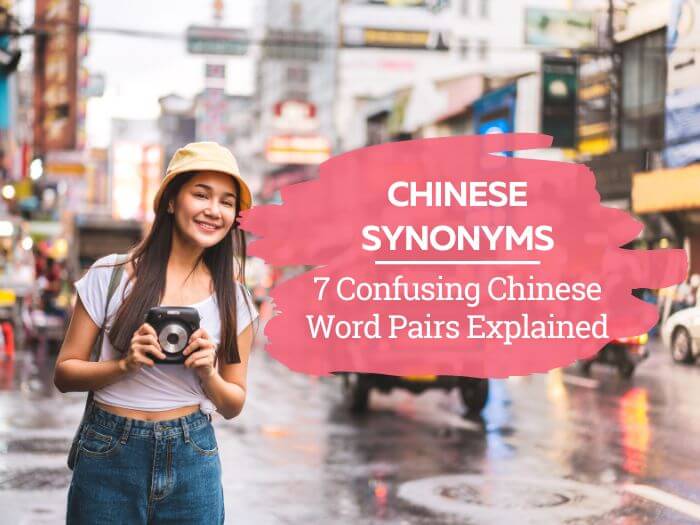When you learn Chinese, you soon realise that it's as far apart from English as two languages could be. So it should come as no surprise that there are lots of differences in the way things are expressed.
As a result, one area that can give you trouble is vocabulary – specifically because sometimes Chinese has two or more words that English speakers might consider synonyms. And it can be challenging to distinguish between them and use them correctly.
To help you overcome this difficulty, in this post, I look at some of the most common Chinese “synonyms” and give you examples of how to use them, allowing you to understand when to employ each word and how to pick the right one with confidence.
Pro Tip
By the way, if you want to learn Chinese fast and have fun, my top recommendation is Chinese Uncovered which teaches you through StoryLearning®.
With Chinese Uncovered you’ll use my unique StoryLearning® method to learn Chinese through story…not rules. It’s as fun as it is effective. If you’re ready to get started, click here for a 7-day FREE trial.
Table of Contents
1. 认识 rènshi & 知道 zhïdào (To Know)

In English, we use the verb “to know” in various situations, but in Chinese, there are two words that cover different concepts of “knowing”.
If you speak a language like French or Spanish, you’ll already be familiar with this idea since they have similar pairs of words – French has connaître and savoir while Spanish uses conocer and saber.
With these pairs of words, French and Spanish both distinguish between knowing a fact and being familiar with a thing or a person, and Chinese works in a similar way.
For example, if you know a person, you use 认识 rènshi, like this:
- 你认识老王吗?我不认识他
- nĭ rènshi lăo wáng ma? wŏ bú rènshi tā
- (Do you know Old Wang? I don’t know him)
- nĭ rènshi lăo wáng ma? wŏ bú rènshi tā
On the other hand, when you’re talking about knowing a fact, you use 知道 zhīdào, like this:
- 你知道他们几点走的呢?嗯, 知道。他们八点已经走了
- nĭ zhīdào tāmen jĭ diăn zŏu de ne? en, tāmen bā diăn yĭjīng zŏu le
- (Do you know what time they left? Yes, I know. They already left at eight o’clock)
- nĭ zhīdào tāmen jĭ diăn zŏu de ne? en, tāmen bā diăn yĭjīng zŏu le
However, Chinese isn’t exactly like French or Spanish because you also use 知道 zhīdào to say you know of somebody, even if you don’t know them personally, like this:
- 你认识老王吗?我知道他但是我不认识他因为我还没见过他
- nĭ rènshi lăo wáng ma? wŏ zhīdào tā dànshi wŏ bú rènshi tā yīnwèi wŏ hái méi jiàn guo tā
- (Do you know Old Wang? I know of him/know who he is, but I don’t know him because I haven’t met him yet)
- nĭ rènshi lăo wáng ma? wŏ zhīdào tā dànshi wŏ bú rènshi tā yīnwèi wŏ hái méi jiàn guo tā
As an aside, there’s another way that Chinese speakers use 知道 zhīdào that I’ve always found quite amusing.
In Chinese, if somebody asks you a question and you explain the answer to them, they often then reply with 知道了 zhīdào le to tell you they’ve understood what you’ve said.
In this sentence, the 了 le is a particle that marks a “new situation”, so the person is implying “I know (now whereas before I didn’t)”.
However, in English, we don’t have the particle 了 le, so in similar situations, when speaking English, Chinese speakers will often reply simply by saying “I know” when a native speaker might say something like “I understand” or “got it”.
Many English speakers who don’t know Chinese find this disconcerting since if you say “I know” in English, it sounds like you are saying you already knew the answer before it was explained to you.
In which case, it leaves you wondering why you were just asked to explain if the person already knew the answer!
2. 还是 háishi & 或者 huòzhĕ (Or)

Another pair of words that exist in Chinese but that we only have one word for in English is 还是 háishi and 或者 huòzhĕ, both of which mean “or”.
Fortunately, though, this is quite an easy one to understand.
When you are giving somebody a choice, you use 还是 háishi – so it’s the form used in questions, like this:
- 今天晚上你想吃火锅还是麻辣香锅?
- jīntiān wănshang nĭ xiăng chī huŏguō háishi málàxiāngguō?
- (This evening, do you want to eat hotpot or malaxiangguo?)
- jīntiān wănshang nĭ xiăng chī huŏguō háishi málàxiāngguō?
(Malaxiangguo is a type of dish where you select the ingredients you want, including things like meat and vegetables, and everything is then stir-fried for you in a wok with lots of chilli and Sichuan peppercorns. It’s absolutely delicious, and I highly recommend it!)
You can also use 还是 háishi when the two options contain a verb, like this:
- 你想吃火锅还是想吃麻辣香锅?
- nĭ xiăng chī huŏguō háishi xiăng chī málàxiāngguō?
- (Do you want to eat hotpot or do you want to eat malaxiangguo?)
- nĭ xiăng chī huŏguō háishi xiăng chī málàxiāngguō?
When there are three or more items, you can list them using the Chinese dunhao punctuation mark (顿号 dùnhào), like this:
- 你想吃火锅、麻辣烫,串儿还是麻辣香锅?
- nĭ xiăng chī huŏguō、málàtàng、chuànr háishi málàxiāngguō?
- (Do you want to eat hotpot, malatang, street barbecue or malaxiangguo?)
- nĭ xiăng chī huŏguō、málàtàng、chuànr háishi málàxiāngguō?
麻辣烫 málàtàng is another eating experience to look out for in China. You sit in the street around a pot of bubbling spicy broth filled with all manner of tasty morsels on wooden sticks.
You then simply take the items you want and pay according to how many sticks you have when you finish.
Don’t mistake the character 烫 tàng, meaning “hot, scalding”, for the character 汤 tāng meaning “soup” – even though the sticks of food are cooked in boiling soup.
串儿 chuànr, on the other hand, are sticks of meat or vegetables that are cooked over barbecues usually in the street although sometimes also in dedicated restaurants. Notice how the character for this looks just like a stick of meat!
However, outside street barbecues have now been banned in Beijing because of the supposed pollution they cause – despite it being a city where millions of polluting cars clog the roads every day. Beijing nightlife is now that bit less vibrant and enjoyable because of this law.
或者 huòzhĕ, on the other hand, is used to express different possibilities when not asking a question. For example:
- 晚上出去玩的时候,我最喜欢吃火锅或者麻辣香锅
- Wănshang chūqù wán de shíhou, wŏ zuì xĭhuan chī huŏguō huòzhĕ málàxiāngguō
- (When I go out in the evening (to have fun), I prefer (most like) to eat hotpot or malaxiangguo)
- Wănshang chūqù wán de shíhou, wŏ zuì xĭhuan chī huŏguō huòzhĕ málàxiāngguō
With three or more items, you can do it the same way as with 还是 háishi, like this:
- 晚上出去玩的时候,我最喜欢吃火锅、麻辣烫、串儿或者麻辣香锅
- Wănshang chūqù wán de shíhou, wŏ zuì xĭhuan chī huŏguō、málàtàng、chuànr huòzhĕ málàxiāngguō
- (When I go out in the evening (to have fun), I prefer (most like) to eat hotpot, malatang, street barbecue or malaxiangguo)
- Wănshang chūqù wán de shíhou, wŏ zuì xĭhuan chī huŏguō、málàtàng、chuànr huòzhĕ málàxiāngguō
3. 可以 kĕyĭ, 能 néng & 会huì (Can, To Be Able To)

In Chinese, there are a couple of different words you can use to mean “can” or “to be able to”.
可以 kĕyĭ and 能 néng are both used to mean “can” and are very similar – but there is a subtle difference.
可以 kĕyĭ implies thatyou are allowed to do something or that you have permission to do it. For example:
- 这儿可以抽烟吗?不可以 zhèr kĕyĭ chōu yān ma? bù kĕyĭ (Can you smoke here? No, you can’t [the person is asking if they are allowed to smoke here])
- 我可以去洗手间吗?可以 wŏ kĕyĭ qù xĭshŏujiān ma? kĕyĭ (Can I go to the toilet/bathroom? Yes, you can)
能 néng, on the other hand, is used to express an ability to do something in a specific situation:
- 我不能去参加你的婚礼,我生病了 Wŏ bù néng qù cānjiā nĭ de hūnlĭ, wŏ shēng bìng le (I can’t go to (join) your wedding, I’m ill)
Finally, when you want to express your ability to do a thing that you’ve learnt to do, you use 会 huì. This word can be translated by “can”, but it can also be translated as “know how to”. For example:
- 我会说中文 wŏ huì shuō zhōngwén (I can speak Chinese)
- 我不会开车 wŏ bú huì kāi chē (I can’t/don’t know how to drive)
However, in Chinese, the idea of “knowing how to do something” or “having learnt to do something” is sometimes stretched to the point where 会huì might not seem the obvious word to use for an English speaker.
For example, you also use 会 huì to say that you drink/can drink alcohol or that you smoke/can smoke, like this:
- 我不会抽烟 wŏ bú huì chōu yān (I don’t smoke/can’t smoke)
- 我会喝酒 wŏ huì hē jiŭ (I drink/can drink alcohol)
- 她很会喝酒 tā hĕn huì hē jiŭ (She can really drink [implying that she drinks a lot or can hold her drink well])
4. 再 zài & 又 yòu (Again)

再 zài and 又 yòu both mean “again”, but the important distinction to remember between them is that 又 yòu is used for things that happened in the past while 再 zài is used for things happening in the present or the future.
For example:
- 他又来了!tā yòu lái le! (He’s come (back) again!)
This is an expression I used to hear often in a particular bar I used to frequent during my time in Beijing!
- 你在做什么? 再复习一次今天的课 nĭ zài zuò shénme? zài fùxí yí cì jīntiān de kè (What are you doing? Revising today’s lesson one more time)
(Note that the zài appears twice here, once in the question and once in the answer, but they are different characters and mean different things: 在 zài here is a marker to indicate a continuous action)
- 我打算再开始学中文 wŏ dăsuàn zài kāishĭ xué zhōngwén (I plan to start studying Chinese again [something that will happen in the future])
Note also that 再 zài appears in the expression 再见 zàijiàn, which is Chinese for “goodbye” – literally, the two characters could be translated as “again see”.
5. 二 èr & 两 liăng (Two)

Chinese has two different words for “two”, and there are rules you have to follow about which one to use.
二 èr is the basic cardinal number used for counting. However, when you want to say there are two of anything, you use 两 liăng instead.
Essentially, this means whenever you use “two” with a measure word (or one of the few words that don’t take measure words) you use 两 liăng. If you always remember this rule, you can’t go wrong.
For example, you always say things like the following:
- 我有两个中国朋友 wŏ yŏu liăng ge zhōngguó péngyou (I have two Chinese friends)
- 他养两只狗 tā yăng liăng zhī gŏu (He has (feeds) two dogs)
- 两天以后见面吧 liăng tiān yĭhòu jiànmiàn ba (Let’s meet in two days)
In the first two examples, because you have the measure words 个 ge and 只 zhī, you have to use 两 liăng – you can’t say *二个 èr ge or *二只 èr zhī.
In the third example, since 天 tiān (day) doesn’t take a measure word, you still use 两 liăng, even though no measure word is present.
Finally, note that when using ordinal Chinese numbers, you always use 二 èr and not 两 liăng, like this:
- 你是我的第二个中国朋友 nĭ shì wŏ de dì èr ge zhōngguó péngyou (You are my second Chinese friend)
6. 我们 wŏmen & 咱们 zánmen (We)

In Chinese, there are two Chinese pronouns for “we”. The first of these, 我们 wŏmen, is the standard version that functions in exactly the same way as the English word and can be used in any situation.
咱们 zánmen, on the other hand, is more specific since it expressly includes both the speaker and the person being spoken to.
This means if you always use 我们 wŏmen, you'll never make a mistake. But if you specifically want to include the person you're speaking to, you can use 咱们 zánmen instead.
Here are some examples:
- 你们去哪里?我们去吃饭
- nĭmen qù nălĭ? wŏmen qù chī fàn
- (Where are you (plural) going? We’re going to have dinner [the person asking the question here is logically probably not included])
- nĭmen qù nălĭ? wŏmen qù chī fàn
- 咱们去吃饭吧!
- zánmen qù chī fàn ba!
- (Let’s go and have dinner! [the speaker expressly includes the person they are speaking to in the “we”])
- zánmen qù chī fàn ba!
- 我们应该回去
- wŏmen yīnggāi huíqù
- (We should go back [whether the person being spoken to is included is ambiguous])
- wŏmen yīnggāi huíqù
- 咱们应该回去
- zánmen yīnggāi huíqù
- (We should go back [here, the person being spoken to is expressly included])
- zánmen yīnggāi huíqù
Note that 咱们 zánmen is mostly used in the north of China, so you’re more likely to hear it in Beijing and the surrounding area. But in other Chinese dialects, people don’t usually use it.
When saying 咱们 zánmen, the “n” is almost silent – in practice, it sounds more like zámen.
7. 就 jiù & 才 cái

These words aren’t synonyms at all – in fact, they’re actually antonyms.
However, they’re a good pair of words to know, they’re extremely common and learning how to use them correctly will make your Chinese sound much more native-like. So I thought I’d include them in this post anyway!
Both of these words have other functions and meanings. But the one we’re going to concentrate on here is when they’re used to say that something happens earlier (就 jiù) or later (才cái) than you expected.
The best way to explain this is to look at a couple of examples, so let’s do that now. Think about the following pair of sentences:
- 他八点就走了tā bā diăn jìù zŏu le (He left at eight o’clock)
- 他八点才走了tā bā diăn cái zŏu le (He left at eight o’clock)
In the first version of this sentence, the idea being expressed by adding 就 jiù is that the speaker expected him to stay for longer, so eight o’clock was earlier than expected.
You might also translate this sentence into English by adding something like “already”, as in “he already left at eight o’clock”.
With the second version, the opposite is true. The speaker is saying that the person was expected to leave before eight, so by leaving at eight, he stayed longer than expected.
When translating into English, you could also add something like “only” or “not until”, as in “he only left at eight o’clock” or “he didn’t leave until eight o’clock”. This could also be a way of expressing the sentiment that the visitor overstayed his welcome!
Here’s another example:
- 我昨天晚上就写完我的作业
- wŏ zuótiān wănshang jiù xiĕ wán wŏ de zuòyè
- (Last night I (already) finished my homework)
- wŏ zuótiān wănshang jiù xiĕ wán wŏ de zuòyè
- 我昨天晚上才写完我的作业
- wŏ zuótiān wănshang cái xiĕ wán wŏ de zuòyè
- (I only finished my homework last night)
- wŏ zuótiān wănshang cái xiĕ wán wŏ de zuòyè
In the first version, the speaker is implying that the homework assignment was expected to take more time, but in the end, they finished it quicker than anticipated.
In the second version, the opposite is true – the person is saying that the homework took them a long time, and they only finished it last night after working on it for longer than expected.
Any of these sentences would still be correct without 就 jiù or 才 cái. But by using these small words, you give more flavour to what you’re saying while at the same time making yourself sound much more like a native speaker!
Chinese Synonyms: High-Frequency Words You Need To Master
All of the words in this post are extremely high frequency in Chinese. So it’s important to understand the differences between them if you want to use them correctly.
However, the good news is that none of them are particularly difficult to understand. So with my explanations and the examples I’ve given, you should now feel much more confident about the precise meaning of these words and which to use in the relevant situations.
And to truly master these words, follow the rules of StoryLearning and read in Mandarin. As you read in Chinese at your level, by using Mandarin graded readers for example, you'll see these words over and over. So you'll master them in no time while having fun.
And if you still need a bit of help with confusing Chinese vocabulary or any other aspect of Chinese, Chinese Uncovered can help. Click here for your free 7-day trial of the method.

Olly Richards
Creator of the StoryLearning® Method
Olly Richards is a renowned polyglot and language learning expert with over 15 years of experience teaching millions through his innovative StoryLearning® method. He is the creator of StoryLearning, one of the world's largest language learning blogs with 500,000+ monthly readers.
Olly has authored 30+ language learning books and courses, including the bestselling "Short Stories" series published by Teach Yourself.
When not developing new teaching methods, Richards practices what he preaches—he speaks 8 languages fluently and continues learning new ones through his own methodology.










































